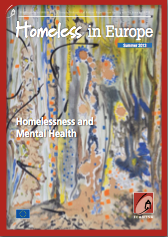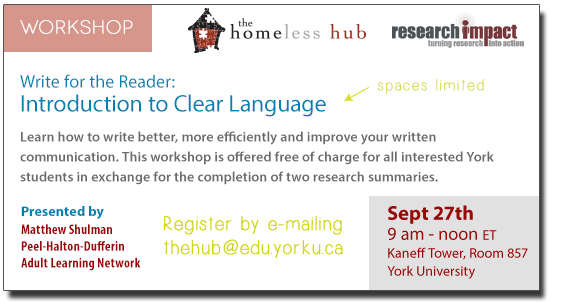Last week at the Homeless Hub:
Happily, we’re still getting lots of hits on two of our “Ask the Hub” questions. The mental health and homelessness infographic that Isaac Coplan, an FES grad student, created for us is still circulating regularly, as is Tanya's answer to a question on giving money to panhandlers. We’d love to answer your questions as well. Please email us at thehub@edu.yorku.ca if you’d like your question to be given to one of our team.
Our colleagues at Europe’s FEANSTA (European Federation of National Organisations working with the Homeless) just released the summer edition of their “Homeless in Europe” magazine focused on mental health and homelessness. From the description:
“Much has been written on the interrelatedness of mental health and homelessness, some arguing that mental health problems lead to homelessness, while others claiming that homelessness is a stress factor which provokes mental ill health. Although the direction of causality is not straightforward, the link clearly shows how mental health cannot be treated in isolation and how its wider social context, e.g. social status, poverty or social relations, has to be considered.”
The 25 Myths of Homelessness – previously published by Christine Schanes in Huffington Post – are a big hit. Our communications staff are promoting different myths daily. These myths include: “Homeless People Just Rest All Day”, “The Police Will Solve It” and “They Make Millions”.
Here at the Homeless Hub we love our social media almost as much as we love research. It’s always exciting when the two combine. We were happy to see the release of the paper “Blurring the Boundaries? New Social Media, New Social Research: Developing a network to explore the issues faced by researchers negotiating the new research landscape of online social media platforms.” The paper stems from a series of activities including workshops and various social media activities that explored whether or not social science researchers should use social media and what it means for them to do so.
Lastly, we want to invite any interested York University students to a workshop we are putting together with ResearchImpact of Knowledge Mobilization Unit at York. The "Write for the Reader: Introduction to Clear Language" workshop will teach you how to improve your written communication and will allow you to produce two clear language research summaries for us on your topic of interest. You can find examples of these in our research summaries section of the site. Make sure to register by e-mailing us at thehub@edu.yorku.ca as spaces are limited.



